Last week’s Library Stat of the Week looked at the relationship between the strength of the library field in any given country, and levels of trust in government.
As highlighted, trust matters because it can be a determining factor in the effectiveness of policies, especially at the time of COVID-19.
This week we look to extend this analysis to indicators of the strength of civic life – i.e. the degree to which people are involved in the lives of their communities.
One way of looking at this is to look at the share of adults involved in formal volunteering opportunities. This can be a way of understanding how invested people are in helping others and improving their environment – i.e. mobilising energies to make for better lives. Data about this is available from the OECD’s Better Life Index.
Data on libraries comes from IFLA’s Library Map of the World.
Another is to look at democratic participation. Figures for participation in elections can tend to be skewed by the existence of obligatory voting, but information is available about levels of engagement, or at least of disengagement. Data on this can be found in the OECD’s Society at a Glance.
Graph 1a looks starts by looking at levels of volunteering across countries.
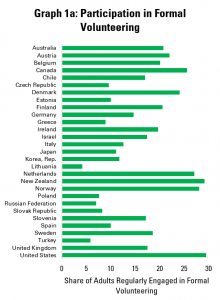
This indicates a high level of variation, with the United States, New Zealand, Norway, the Netherlands and Canada having the highest levels, with over a quarter of adults volunteering regularly. The lowest share is in Lithuania, at 4.2%.
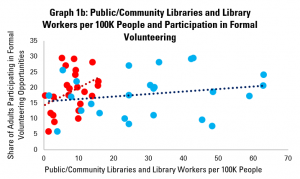
Graph 1b then compares this with the numbers of public and community libraries per 100 000 people. As last week, we have focused on countries with up to 20 public or community libraries per 100 000 people, and up to 70 public or community library workers per 100 000 people. This represents the large majority of countries, and avoids distortion from outliers.
This indicates that there is a generally positive correlation between the strength of library fields and prevalence of volunteering. While of course correlation is not causality, it fits with the idea of libraries as both catalysts and symbols of social and civic engagement.
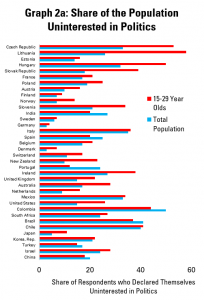
Turning to the question of levels of interest and engagement in politics, Graph 2a gives an idea of the share of the population in surveyed countries declaring that they have no interest in the subject.
This indicates that in most countries, young people (aged 15-29) tend to demonstrate higher levels of lack of interest in politics. The highest overall levels of lack of interest in the population as a whole are in Brazil, Chile and Colombia (all at 40% or more), while amongst younger people, it is Lithuania, the Czech Republic and Hungary that see the highest numbers of people declaring that they are not interested (50% or more).
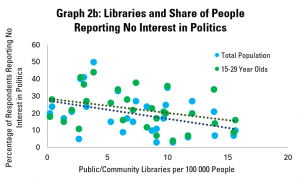
Graph 2b then compares these figures with the numbers of public and community libraries per 100 000 people. As before, we have focused on countries with up to 20 public or community libraries per 100 000 people, and up to 70 public or community library workers per 100 000 people.
This indicates that, in general, countries with more libraries tend to have smaller shares of people (both in general, and younger adults) declaring that they have no interest in politics at all. The relationship is slightly weaker with younger adults than with the adult population as a whole.
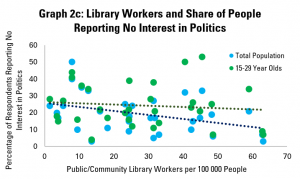
Graph 2c performs the same analysis with numbers of public and community library workers. Again, there is some correlation, with more library workers tending to be associated with lower numbers declaring no interest in politics.
As with volunteering, correlation does not mean causality, but would fit with the idea that libraries can support a greater feeling of community, and so engagement in decision-making.
Overall, the analysis presented in this post should support arguments that a stronger public and community library field is associated with stronger social and civic life, delivering both on SDGs 11 and 16.
Find out more on the Library Map of the World, where you can download key library data in order to carry out your own analysis! See our other Library Stats of the Week! We are happy to share the data that supported this analysis on request.